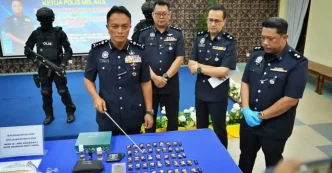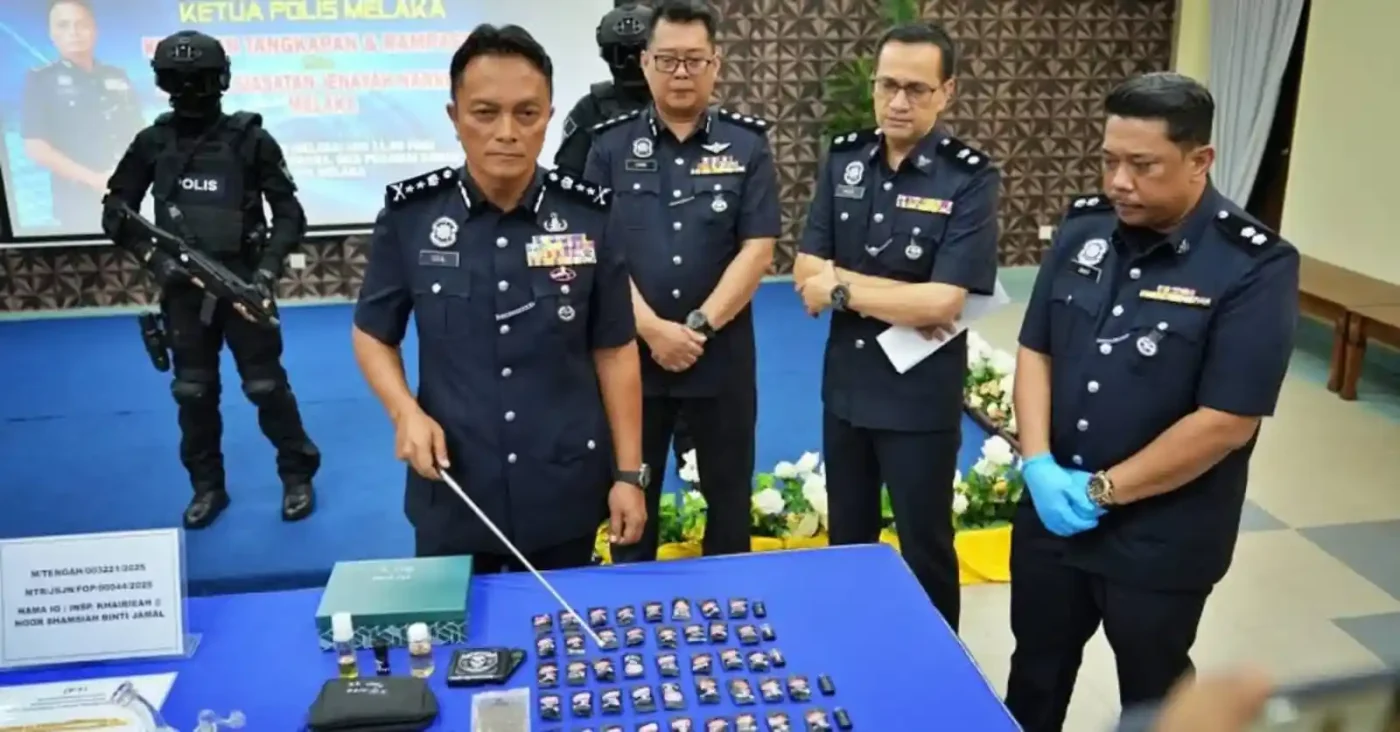In a significant crackdown on narcotics trafficking, Malaysian police have arrested a Singaporean man and his Malaysian wife in Melaka for allegedly distributing drug-laced vape fluid and other substances, reportedly targeting schoolchildren. The couple, married just three months ago, were apprehended in a raid on their rented home in Jasin Bestari, raising serious concerns about the accessibility of drugs to vulnerable groups in the region.
Details of the Arrest and Seizure
On Monday, May 26, at 11 a.m., a team from the Jasin district narcotics investigation unit detained the 41-year-old Singaporean man and his 38-year-old Malaysian wife. Melaka police chief Deputy Commissioner Datuk Dzulkhairi Mukhtar revealed during a press conference on Tuesday, May 27, at the state police headquarters in Bukit Beruang, that preliminary investigations suggest the couple had been distributing various drugs across the state over the past three months. “Preliminary investigations indicate that the couple had been actively distributing various types of drugs in the form of vape liquids, pills, and powders” said Dzulkhairi.
The haul from the raid was substantial. Authorities seized 127.5ml of ketamine believed to be intended for use in vape devices, 212 ecstasy pills, 212 Erimin 5 pills, 13.7g of methamphetamine, 10g of cannabis, and 80g of ketamine powder—enough to supply approximately 786 drug abusers, according to police estimates. Additionally, a car and a motorcycle belonging to the couple were confiscated. The total value of the seized items and assets is estimated at 32,650 Malaysian Ringgit (US$6,900), based on exchange rates as of the publication date.
Dzulkhairi also noted that both suspects tested positive for methamphetamine during initial screening, further complicating their case. “The drugs were believed to have been marketed through social media and close personal contacts” he added, highlighting the modern methods used to reach potential buyers, including possibly underage individuals.
Targeting Vulnerable Communities
The allegation that the couple distributed drug-laced vape fluids to schoolchildren has sparked outrage and concern among local communities and authorities. While the police have not yet released specific evidence confirming the direct targeting of students, the nature of the substances—disguised in vape liquids—suggests an intent to appeal to younger demographics who may be drawn to vaping as a trend. If confirmed, this could point to a troubling new tactic in drug trafficking, exploiting the popularity of e-cigarettes among teenagers.
Vaping has become a growing concern in Malaysia, with health and education officials repeatedly warning about the risks of addiction and the potential for vape products to act as gateways to harder drugs. The possibility that narcotics are being integrated into these devices adds a dangerous dimension to an already pressing public health issue. Local schools in Melaka and beyond may now face increased pressure to educate students about the risks of such products, while law enforcement grapples with the challenge of tracking distribution networks that operate through discreet online platforms.
Legal Implications and Ongoing Investigation
The couple has been remanded for seven days to assist with investigations under Section 39B of the Dangerous Drugs Act 1952, a provision that carries severe penalties for drug trafficking in Malaysia, including the possibility of the death penalty or life imprisonment if convicted. The seriousness of the charges reflects the country’s strict stance on narcotics, particularly when distribution networks are believed to impact young people.
Police are now working to uncover the full extent of the couple’s operations, including identifying suppliers and buyers within their network. The use of social media as a marketing tool complicates the investigation, as digital platforms often allow traffickers to operate anonymously or across borders. Authorities have yet to confirm whether the couple sourced their drugs from international connections, though the involvement of a Singaporean national may prompt cross-border collaboration in the coming weeks.
Broader Context of Drug Trafficking in Malaysia
Malaysia has long been a transit point and market for illicit drugs in Southeast Asia, despite its stringent laws and penalties. The Golden Triangle—comprising parts of Thailand, Laos, and Myanmar—remains a major source of narcotics like methamphetamine and heroin, which often flow through neighboring countries, including Malaysia. In recent years, synthetic drugs such as ecstasy and ketamine have also surged in popularity, often distributed at parties and through underground networks.
The emergence of drug-laced vape fluids represents a new frontier in this ongoing battle. Unlike traditional drugs, these substances can be disguised as harmless or trendy products, making them harder to detect and more appealing to unsuspecting users. This case in Melaka underscores the adaptability of traffickers, who continue to innovate in response to law enforcement efforts.
According to the National Anti-Drug Agency (AADK), Malaysia recorded over 20,000 drug-related arrests in 2024 alone, with a significant portion involving young people under the age of 25. While rehabilitation programs and public awareness campaigns have been rolled out, the persistent demand for drugs—coupled with economic and social pressures—continues to fuel the trade. The Melaka case, if linked to schoolchildren as alleged, could reignite debates over the effectiveness of current prevention strategies and the need for stricter regulations on vaping products.
Community and Official Responses
The arrest has prompted strong reactions from local leaders and residents in Melaka, a state known for its historical significance and tourism appeal rather than crime. Community organizations have called for increased vigilance among parents and educators, urging them to monitor children’s online activities and educate them about the dangers of drugs disguised in everyday items. “We cannot allow our youth to fall prey to such insidious tactics” said a spokesperson for a local parents’ association during a public forum on Tuesday evening.
Meanwhile, state officials have pledged to intensify efforts to combat drug trafficking, with plans to enhance cooperation between police, schools, and community groups. There are also discussions about tightening regulations on the sale and distribution of vaping products, which are currently subject to less oversight than traditional narcotics. Whether these measures will curb the spread of drug-laced fluids remains to be seen, but the urgency of the issue is clear.
Looking Ahead
As the investigation into the Melaka couple unfolds, questions linger about the broader implications of their alleged activities. How many young lives may have been affected by their distribution network? What steps can authorities take to prevent similar cases in the future, especially given the covert nature of online drug sales? For now, the case serves as a stark reminder of the evolving challenges in the fight against narcotics in Malaysia, where innovation by traffickers often outpaces regulatory responses.
The coming weeks will likely reveal more about the couple’s connections and the full scope of their operations. In the meantime, the community in Melaka—and across Malaysia—watches closely, hoping for justice and stronger safeguards to protect the next generation from the scourge of drugs.
















